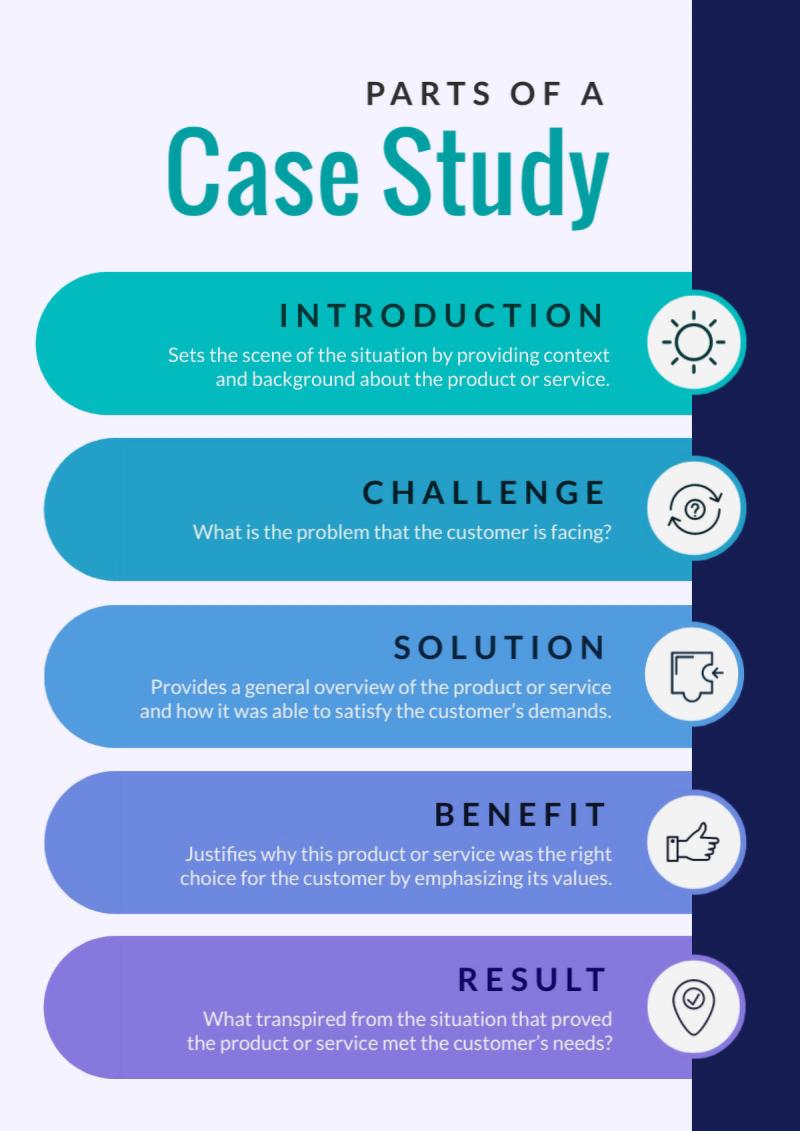How to become part of a case study?
Becoming a participant in a case study typically involves specific steps and considerations, depending on the nature of the study and the researcher's requirements. Here's a general guide on how to become part of a case study:
Identify a Relevant Study:
- Start by identifying a case study that aligns with your interests, experiences, or circumstances. This could be related to a research project, clinical trial, educational study, or other areas of study.
Contact the Researcher or Organization:
- Reach out to the researcher or organization conducting the case study. This contact information is often provided in study recruitment materials, academic websites, or research institutions.
Express Your Interest:
- Communicate your interest in participating in the case study. Explain why you believe you are a suitable candidate and how your participation can contribute to the study's objectives.
Review Informed Consent:
- The researcher will typically provide you with an informed consent document. Carefully review this document, which outlines the study's purpose, procedures, potential risks and benefits, and your rights as a participant.
Ask Questions:
- Don't hesitate to ask any questions you may have about the study, including its duration, requirements, and any compensation or incentives for participation.
Provide Consent:
- If you are comfortable with the study's terms and have no further questions or concerns, provide your informed consent by signing the document. Your consent indicates your willingness to participate voluntarily.
Participate in the Study:
- Once you have consented to participate, you will follow the study's specific procedures, which can vary widely. This may involve interviews, surveys, medical tests, observations, or other data collection methods, depending on the nature of the study.
Follow Study Protocols:
- It's important to follow the study protocols and requirements as instructed by the researcher or organization. Your cooperation helps ensure the study's integrity and the accuracy of the data collected.
Maintain Communication:
- Keep lines of communication open with the researcher or study team. Inform them of any changes in your circumstances or any difficulties you encounter during your participation.
Respect Privacy and Confidentiality:
- Be aware that case studies often involve the collection of personal or sensitive information. Researchers should maintain the privacy and confidentiality of your data as per ethical guidelines and regulations.
Conclude Your Participation:
- Once your participation in the case study is complete, follow any guidelines provided by the researcher regarding your role in the study's conclusion and dissemination of results.
It's crucial to understand that participation in case studies is voluntary, and you have the right to withdraw your consent at any time without penalty. Additionally, make sure the study and its researchers adhere to ethical standards and have received proper approval from an ethics review board or institutional review board if human subjects are involved in the research.
Becoming Part of a Case Study: Involvement and Participation
Participating in a case study is an opportunity to contribute to research and gain valuable insights into a particular topic or phenomenon. Case studies involve in-depth investigations of individuals, groups, or events to understand complex issues and gain new perspectives.
Involvement and Participation
As a case study participant, you play a crucial role in providing researchers with firsthand information and experiences. Your involvement may include:
Interviews: Participating in one-on-one or group interviews to share your experiences, thoughts, and perspectives.
Surveys: Completing questionnaires or online surveys to provide detailed information about your background, experiences, and opinions.
Observations: Allowing researchers to observe your behavior and interactions in natural settings.
Documentation: Providing researchers with access to personal documents, diaries, or other relevant materials.
Contributing to Research as a Case Study Participant
Your participation in a case study directly contributes to the advancement of knowledge and understanding. Your experiences and insights help researchers:
Develop new theories: Your experiences may provide valuable data for developing new theories and models to explain complex phenomena.
Improve existing theories: Your insights may help refine existing theories and provide new perspectives on established concepts.
Identify new research questions: Your experiences may raise new questions that require further investigation and research.
Improve practices and interventions: Your experiences may inform the development of better practices, interventions, and policies.
Your Role in a Case Study: Joining the Research Process
Participating in a case study involves becoming an active partner in the research process. Your role includes:
Providing accurate and honest information: Sharing your experiences and perspectives truthfully and openly is crucial for the validity of the research.
Being open to feedback: Researchers may seek your feedback on their interpretations of your experiences and perspectives.
Respecting confidentiality and privacy: Researchers are bound by ethical guidelines to protect your privacy and maintain confidentiality.
Communicating any concerns: If you have any concerns or questions about the research process, feel free to communicate them to the researchers.
Additional Considerations
Before participating in a case study, it is important to:
Understand the purpose and objectives of the research: Clearly understand the research questions and how your participation will contribute to the study.
Be aware of potential risks and benefits: Consider any potential risks or discomforts associated with participation and weigh them against the potential benefits.
Review the informed consent document carefully: Read and understand the informed consent document before signing, ensuring that you agree to the terms and conditions of participation.
Feel comfortable with the researcher: Establish a rapport with the researcher and feel comfortable sharing your experiences and information.
Participating in a case study can be a rewarding experience that contributes to the advancement of knowledge and understanding. By being an informed and active participant, you play a crucial role in the research process and help generate valuable insights that can improve our understanding of the world around us.












